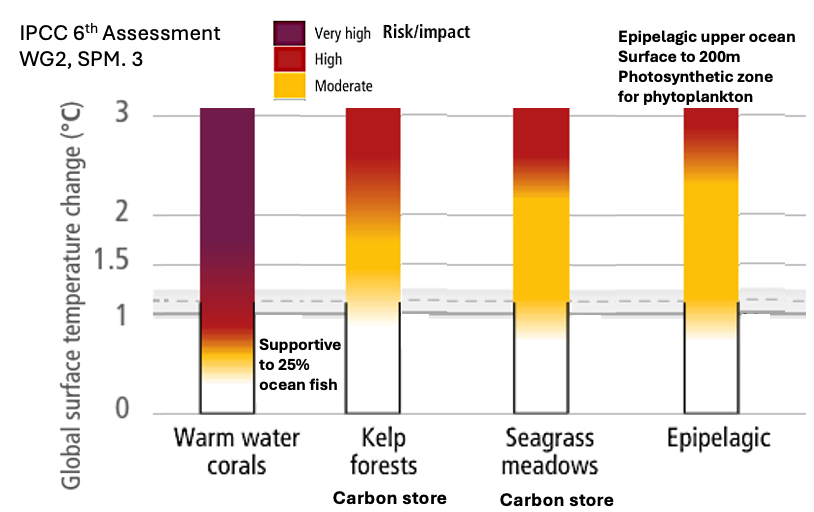Oceans
July 2015 Science Immediate and substantial reduction of CO2 emissions is required to prevent the massive mostly irreversible impacts on ocean ecosystems and their services
According to the NOAA on ocean acidity, the oceans are more acid than they have ever been over the past 20 million years. In 50 years acidity will increase 120% if no emergency response is initiated.
Ocean acidification is faster today than it has over the past 300 million years
Warming of the surface water causes bleaching and death of corals reefs, which play a fundamental role in supporting ocean biodiversity.
Deeper ocean warming slows currents that play a crucial role in bringing oxygen and food to marine creatures, and also in ocean cleansing. Consequently, deep hypoxic ocean dead zones are forming and expanding.
According to the NOAA on ocean acidity, the oceans are more acid than they have ever been over the past 20 million years. In 50 years acidity will increase 120% if no emergency response is initiated.
Ocean acidification is faster today than it has over the past 300 million years
Warming of the surface water causes bleaching and death of corals reefs, which play a fundamental role in supporting ocean biodiversity.
Deeper ocean warming slows currents that play a crucial role in bringing oxygen and food to marine creatures, and also in ocean cleansing. Consequently, deep hypoxic ocean dead zones are forming and expanding.

Today's accelerating triple oceans degradation is a planetary emergency in its own right

Climate Emergency Institute
15 Jan 2015 Ocean Life Faces Mass Extinction, Broad Study Says.
Great straightforward information
Ocean scientists for Informed Policy
Ocean scientists for Informed Policy
3 July 2015 '...impacts on key marine and coastal organisms, ecosystems, and services are already detectable, and several will face high risk of impacts well before 2100, even under low-emissions scenario. These impacts will occur across all latitudes. Immediate and substantial reduction of CO2 emissions is required to prevent the massive and mostly irreversible impacts on ocean ecosystems and their services
Greenhouse gas emissions damage the world's oceans
They cause ocean heat (92% added GHG heat from
emissions has gone to the oceans-'heat content')
This, and increasing sea surface temperature,
is bringing about ocean deoxygenation (deep open ocean)
CO2 emissions cause ocean acidification
Triple assault on oceans
o Heating
o Acidification
o De-oxygenation
They cause ocean heat (92% added GHG heat from
emissions has gone to the oceans-'heat content')
This, and increasing sea surface temperature,
is bringing about ocean deoxygenation (deep open ocean)
CO2 emissions cause ocean acidification
Triple assault on oceans
o Heating
o Acidification
o De-oxygenation
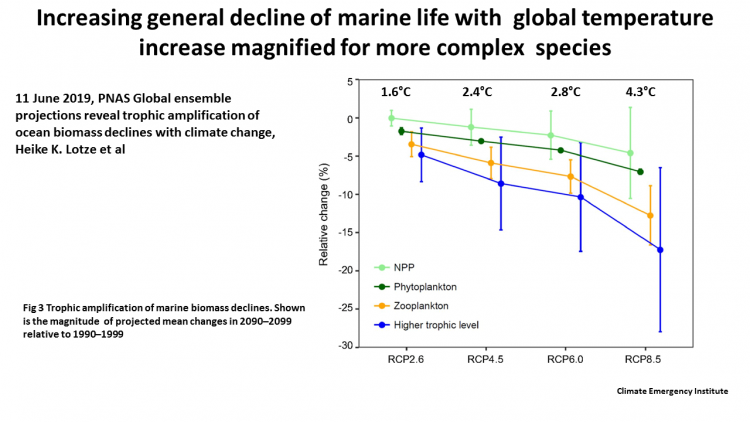
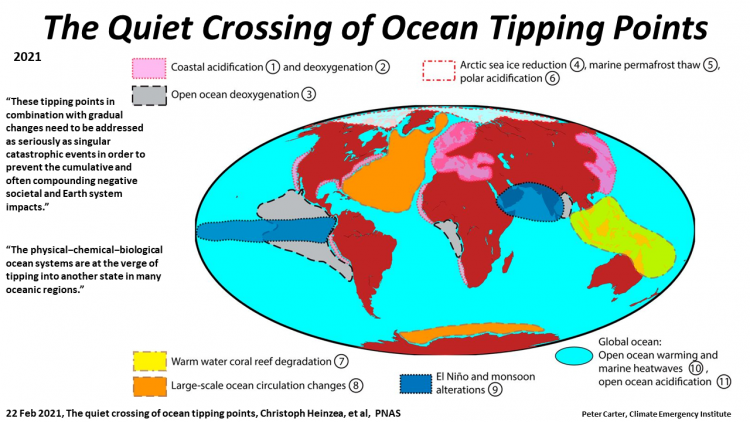
5 Oct 2021 State of World's Coral Reefs 2020, 2009- 2018 14% coral loss
Coral reefs are harmed by ocean surface warming and acidification
The Great Barrier Reef 2024 6th mass bleach was the worst yet
Coral reefs are harmed by ocean surface warming and acidification
The Great Barrier Reef 2024 6th mass bleach was the worst yet
17 December 2020, The quiet crossing of ocean tipping points, C. Heinze et al

Increasing ocean heat is interfering with vertical mixing
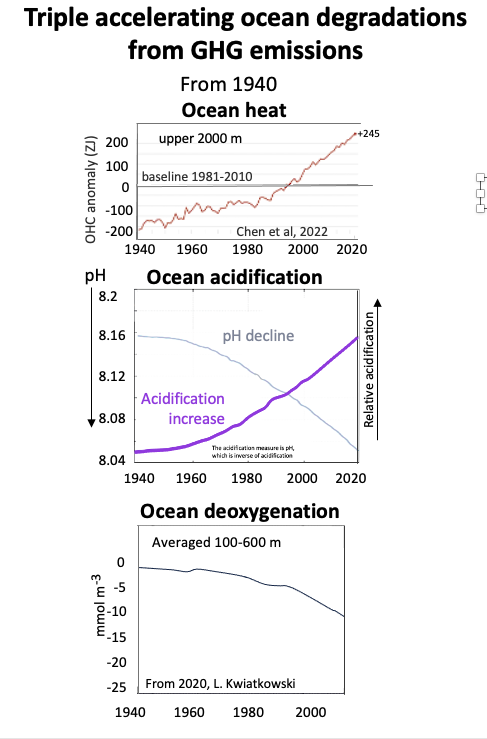
28 Oct 2023, Recent acceleration in global ocean heat accumulation by mode and intermediate waters, Zhi Li et al
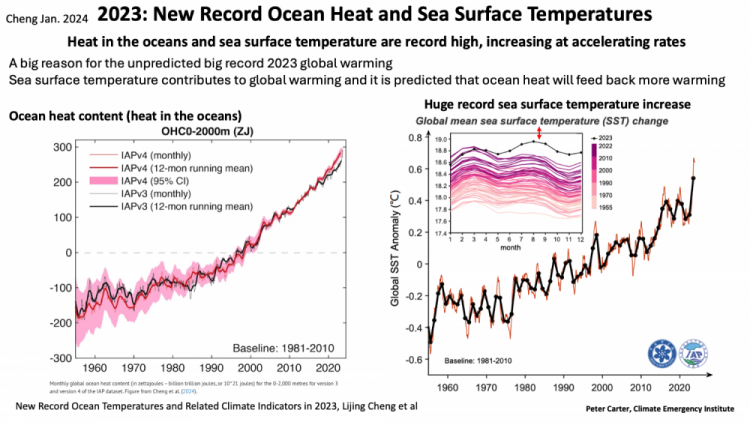
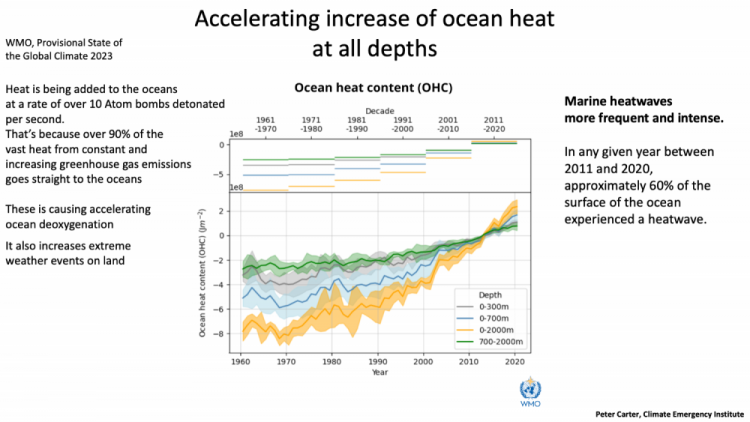
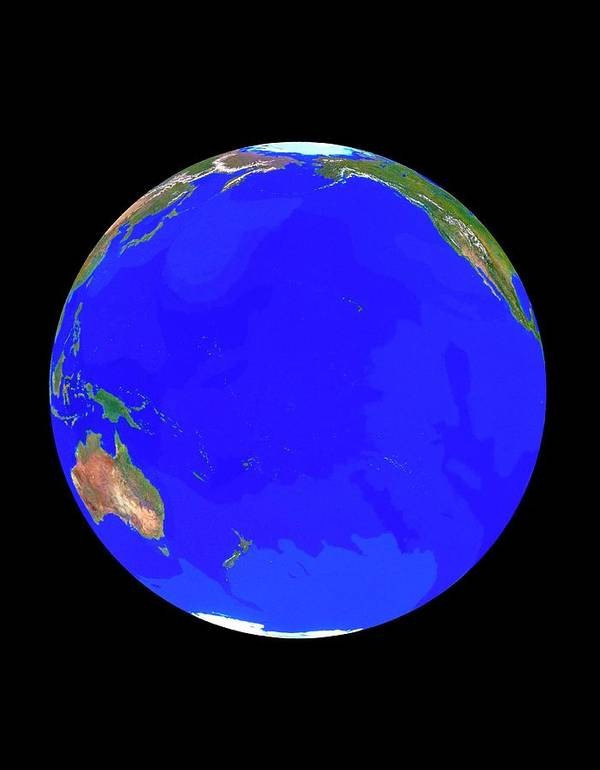
They are increasing
at accelerating rates
at accelerating rates
Planet Ocean
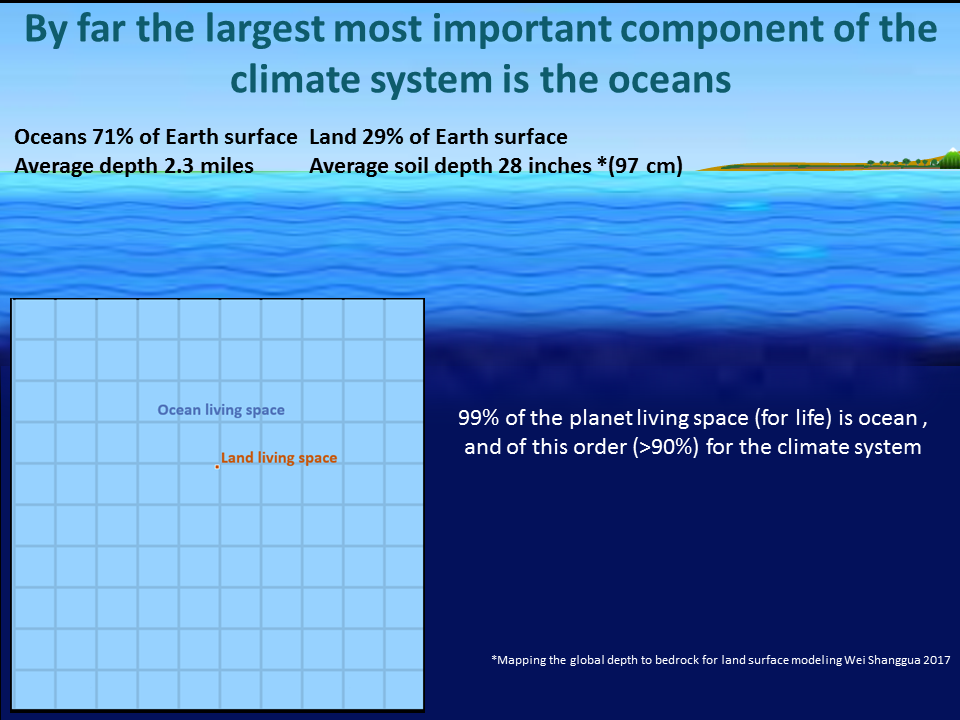
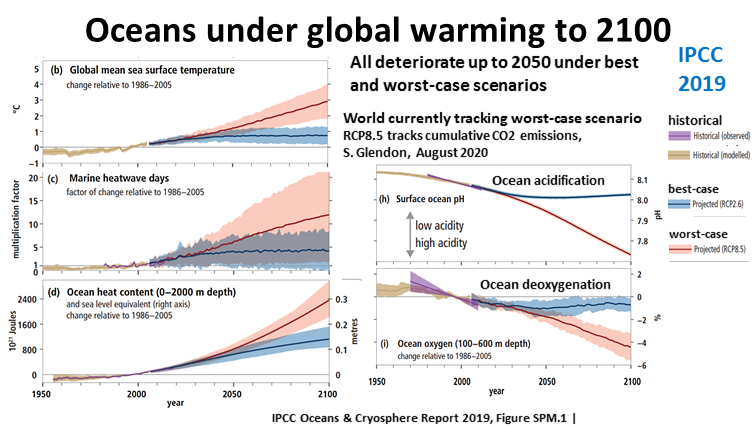
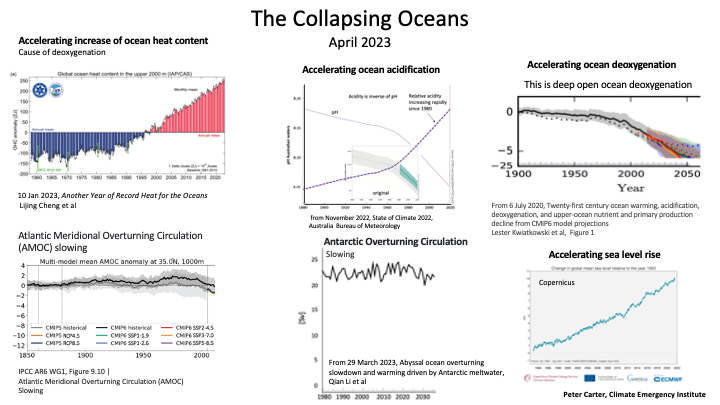
Insights IPCC’s Sixth Assessment, 2023, Climate Oceans Platform
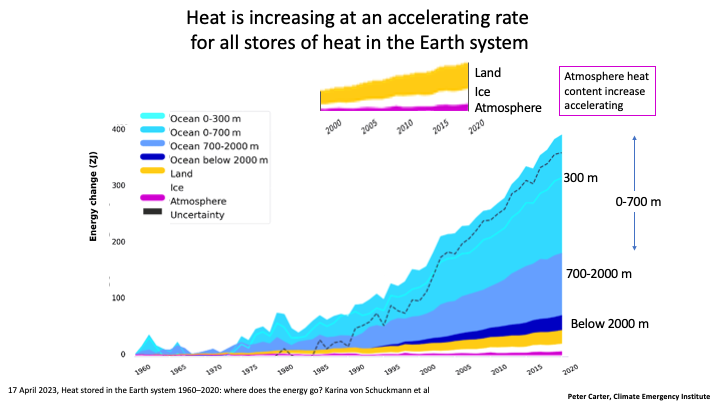
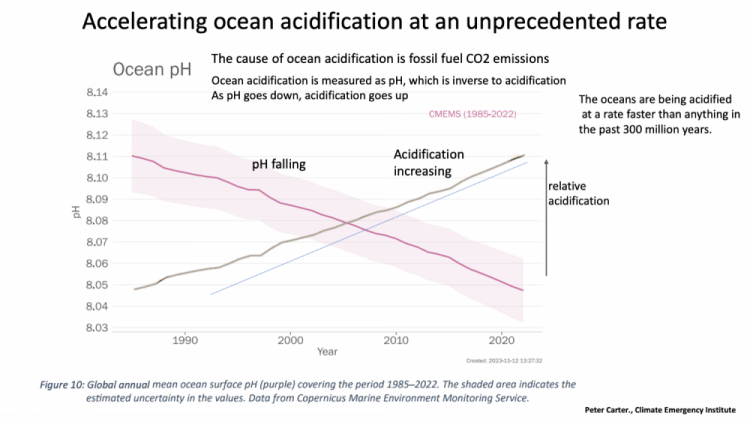
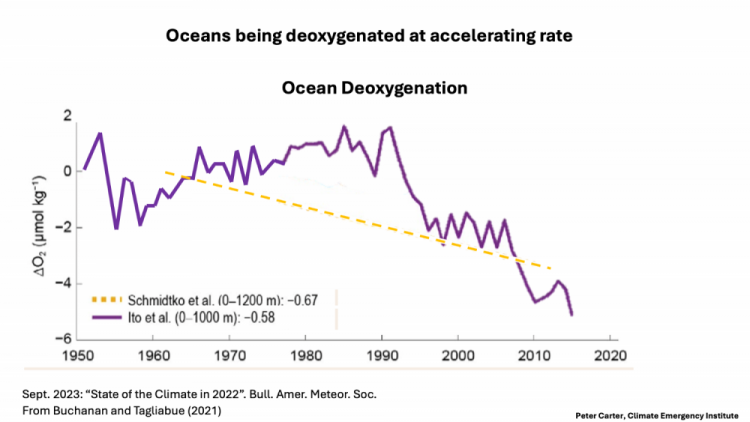
21 Sept 2021, Overview Ocean Climate Change Indicators
Surface Temperature, (ii) Heat Content, (iii) acidity, (iv) Oxygen
(v) Arctic Sea Ice (vi) Sea Level and (vii) AMOC HAS IT ALL
Surface Temperature, (ii) Heat Content, (iii) acidity, (iv) Oxygen
(v) Arctic Sea Ice (vi) Sea Level and (vii) AMOC HAS IT ALL
Immediate and substantial reduction of CO2 emissions is required to prevent the massive mostly irreversible impacts on ocean ecosystems and their services (2015 publication).
Projections
Plankton
Tiny organisms are hugely important
They are essential our survival, and essential for most life
This short peice by MIT is helpful
They are affected by ocean warming and acidification
Acidification impairs shell producing zooplankton, essential to the oacen carbon sink
One thing that appears certain is that ocean heating will deprive plankton of nutrients, because this happens by the vertical mixing of ocean water.
Some phytoplankton suffer under warming while some prosper- the large rapid changes to composition would be expected to be harmful to ocean ecosystems
Ocean acidification is harmful to some acidification
The shell forming zooplankton are harmed by ocean acidification, so impairing the ocean carbon pump- the basis of the ocean carbon sink
Tiny organisms are hugely important
They are essential our survival, and essential for most life
This short peice by MIT is helpful
They are affected by ocean warming and acidification
Acidification impairs shell producing zooplankton, essential to the oacen carbon sink
One thing that appears certain is that ocean heating will deprive plankton of nutrients, because this happens by the vertical mixing of ocean water.
Some phytoplankton suffer under warming while some prosper- the large rapid changes to composition would be expected to be harmful to ocean ecosystems
Ocean acidification is harmful to some acidification
The shell forming zooplankton are harmed by ocean acidification, so impairing the ocean carbon pump- the basis of the ocean carbon sink
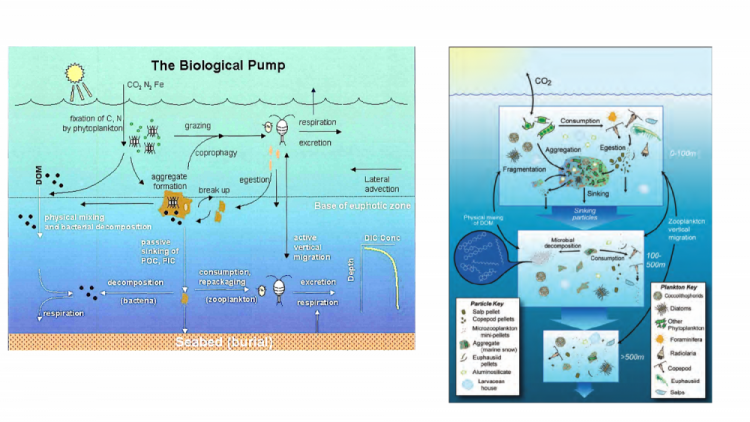
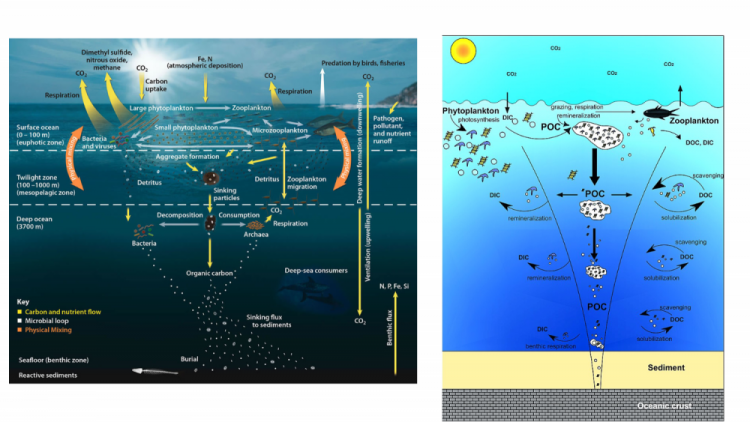
IPCC 6th Assessment calls calls for 'immediate' rapid decline to stabilize climate
